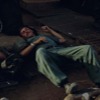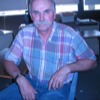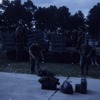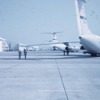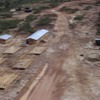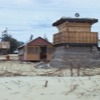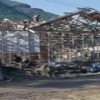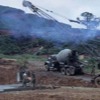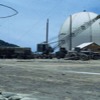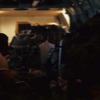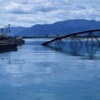

If you see this message, that means that you either do not have the latest version of Adobe Flashplayer installed (install it here) or you have blocked the ActiveX control for Internet Explorer. Please reload the page and allow the control.
 |
 |
 |
| Mr. Kenney: 1960's | Mr. Kenney: 2006 | |
| Mr. Kenney desribes the bomb shelters soldiers would hide in during bombings. | Mr. Kenney recalls the comraderie in the Army. |
Mr. Kenney was born in 1946, and grew up in Waltham, Massachusetts. He went through Waltham’s public school system, and was, as he describes, the “classic-underachiever.” He continued his education after high school at Lowell Tech and Wentworth Institute of Technology. He decided that rather than taking the chance of being drafted, he would volunteer to join the army as a non-combatant and became a member of the Navy Construction Battalion.
During his time in Vietnam, he built living barracks for soldiers, airway strips, and took part in many other projects. He saw an occasional missile launched his way, but for the most part had a peaceful experience. He swam in beautiful, clear water, and worked on the base camp. His experience in the army directly affected his life after the war. He became a construction contractor easily after his experience and is still in the business today.
· This is Stephanie Sklar and Allison Walsh, with Mr. Kenney on Friday May 5, 2006 at 2:30 at Wayland High School.
Q: Where were you born and when?
Mr. Kenney: I was born in Waltham in 1946.
Q: Please talk about your childhood, school and siblings, if any.
Mr. Kenney: I grew up in Watertown and I spent all my school years there. I have one sister who is four years younger. And you know the baby boom generation, and there were kids every place, and you know you go down to the park and there would be kids every place and everybody walked and rode bicycles; so different from Wayland.
Q: What did your parents do for work?
Mr. Kenney: My dad worked in a construction business; he worked for himself a lot, and then he worked for someone else for a while. I kind of grew up in the business; which had a big effect on me down the road, because that what I ended up in through a lot of twists and turns along the way.
Q: Your high school experience…
Mr. Kenney: I went to Watertown High School, and I was the classic underachiever. It was a big school and it was about 475 kids in the graduating class, so if you wanted to play baseball you know there were nine spots, so you know when you look at it, it was really competitive athletically and academically. And I did all right; I didn’t take it real seriously. I got through it.
Q: Were you aware politically while you were in high school about the situations around the world? As in your dad and World War Two…
Mr. Kenney: My dad always talked about it; he was one of those guys who talked about it. He was in the Pacific Theater. Ironically, and unbeknownst to me, he was in a construction battalion, CBs, and that was eventually what I ended up doing, just kind of the way it worked out. Yeah you’d hear about it and his generation always had a big camaraderie among the males mostly; the people in the war and what they did. Also and growing up, which is very different than now that when I grew up, they had the draft and so you knew at some point you were going to have to do some military service; probably because they didn’t have the Peace Corps then. So it was a matter of some people did it right out of high school and got it out of the way; 2 years and got their obligation done, other people waited, so you always had that kind of thing hanging over your head. You dealt with it somehow.
Q: Were you drafted or did you go voluntarily?
Mr. Kenney: Well it was a long story see, I went out of high school I was going to be an engineer and I really didn’t have a great background. Between my teachers and my attitude and so I went off to Lowell, which is now Lowell University/Lowell Tech and I didn’t do that well. So, I decided I what I really needed to do was to regroup here. So I decided I really needed to go through algebra again if I went on to calculus. And so, I went on to Wentworth, which was a 2-year program at the time and it reviewed algebra and moved on. This was in ’65; this is when Vietnam was just starting to build up. Up to that point, if you were in school you got an automatic 2S, a student deferment. Then they started needed a build up, they needed more people and a lot of time kids went to college and had 2S’s, so they got drafted because they said they weren’t making normal progress in school. They went from a 4-year school to a 2-year school. So I really didn’t know what to do, and this was before anything either of you would know. 2 years later they had counseling on college campuses. So, I ended up joining the navy because I didn’t want to be drafted. So that’s how I ended up being in the navy. So that was just the choice I made at the time.
Q: Were you worried about fighting, since you said you knew you would most likely end up in Vietnam?
Mr. Kenney: At a certain point, things kind of played out. I went to boot camp and then I’m in here. I may as well see what I can get out of this deal. I applied to be an electronic technician, which is the biggest school they have, you know. Like 40 weeks or something, but I didn’t get that. So, they had all that stuff, totally esoteric, like flag man, boilermaker. I didn’t want to do any of that stuff. They had an opening for construction battalion, so I thought maybe I could learn something. So that is what I applied for and that’s what I got. At that point they were building enough for construction battalion in Vietnam. It was okay; I wasn’t theoretically going to shoot people.
Q: What kind of training do you get for that? Do you get specific training for the construction battalion?
Mr. Kenney: Yes, you choose certain things. They give you 3 choices. Construction battalion was my 2nd choice. Then they assign you to school. They sent me off to school for 12 weeks, then you are going to be a builder.
Q: What kinds of things did you build while you were there?Mr. Kenney: In Vietnam it was kind of dependent, like, we did everything from radar sites on top of remote mountains to air fields, helicopter pads, roads and bridges, and it kind of depended on what the need was. I have a few pictures I could show you to get a sense of what we were doing.
Q: Well, did you have views about the war before you got there? If you did, did you agree or disagree?
Mr. Kenney: I was kind of naïve. When I first went in, before I even went in, I was a naïve kid. I didn’t get the picture. I was a slow developer. I remember this kid, and we would be having an argument about that the war was starting to build up and we were riding someplace with a bunch of guys, and this one kid goes, I’ll tell you what they need in Vietnam, they need the Peace Corps, they don’t need the army. And I’m thinking gee, I really never even thought about it. But I mean, I didn’t think about it until I got there, you know.
Q: Did you have a more defined view while you got there?
Mr. Kenney: After a while my view was, as far as the people, the peasant population, which is the majority, I felt that they really, what they wanted to do was live in peace and raise a family. There was a big geo-political struggle.
Q: When you flew there, what was it like saying goodbye to your family and friends? Was it really hard? Did you know how long you were going for?
Mr. Kenney: Yeah, see what happened was, at the time, the war was 12 months continuous service in Vietnam they couldn’t send you back in the same enlistment. And so because there wasn’t enough construction battalion to go around, they circumvented it by, sending you over for 9-months, then send you back to the states for re-training, and then they would send you back for another 9-months. So I landed in June 0f ’67, it was very depressing because you are on the Gulf coast of Mississippi and 24 hours later you are stepping of the plane in Danang. Have you ever been in the tropics where is really humid? This heat just envelops you. It was in the middle of the summer. It was really hot; it was really depressing.
Q: What did you do to deal with the heat?
Mr. Kenney: After a while you just got use to it. You just kind of acclimated to it, but being young helped.
Q: Will you describe the kind of living quarters and where you lived?
Mr. Kenney: I have some pictures. That is one of the things we did is provide housing. So of course, we built our housing first which was basically a building about this long and a little narrower. It was a wood frame with a tin roof. Outside or inside, depending on where you were, you had mortar attacks you had pits so if you got attacked you would jump into the pit and man your defense. It really wasn’t that bad. Both times the main base was right on the beach. You could hang around the beach. It was hot but you could go swimming if you wanted to during the day.
Q: Was the water clean?
Mr. Kenney: Yes, it was beautiful! The place was gorgeous, a tropical paradise. You could go look north and all you could see is white beach and waves rolling in; rain forest. It was gorgeous.
Q: So you liked swimming a lot during your free time, or what else would you do?
Mr. Kenney: Well some you know, not a lot. When you were at the main camp you had the option of going swimming if you want or even take your surfboard, and you could surf in the water. You see, this is how bizarre it was, but I mean, this was in the main camp and they’d have certain perimeters set up that would be in the main camp. So when you had to be sent outside on detachment to go with the Marine Corps someplace to build something you wouldn’t want to go swimming there.
Q: What else would you do in your free time?
Mr. Kenney: Well mostly you were working most of the time so you’d come back, and if you were on a big project like Danang then you were outside of camp so you’d come back and you’d get on one of those National Guard trucks, you know, with the people riding in the back of. So you’d get in one of those and you’d go to wherever the job site was. We built some facilities for the marines, the marine medical battalion. So you would go to the job and it would be a twenty to thirty minute ride, and then you’d come back and get something to eat when you got back. You could go down to the bar, they had a so-called plaza, and you could go down to the bar and have drink and play pool if you wanted. This was in the main big camp, but if you were up in a smaller detachment someplace then basically you had your hut and that was it. You could listen to music or you could read; they really didn’t have too much there. You could get a beer or something like that.
Q: You were talking about the pits before that you would jump into if anything happened when you were at the main camp.
Mr. Kenney: Well yeah everyplace you went had that because you could have a rocket attack during the night. Like at the main camp, if you had a rocket attack the pits were outside, so you’d run outside; well you’d get your riffle, helmet, and jacket, then run outside and jump in the hole. And then, when things would calm down a little bit you’d run, you’d have to run to your perimeter because everybody had a position that they had to be in incase you were going to be overrun. So you’d have to run to that position, which would be another hole in the ground, and you just would wait. You might be there all night or you might be there an hour.
Q: Did that happen a lot?
Mr. Kenney: No not a lot, it would come in spurts. I was pretty lucky. It seemed that wherever I went it was pretty ok. I went to the DMZ, but then it was quiet. I was fairly lucky, but we had some rough attacks.
Q: Were you ever in combat?
Mr. Kenney: No, not really.
Q: Did you ever see the V.C. or Vietnamese people?
Mr. Kenney: Well the Vietnamese were everywhere, but you never really knew who was who. They wanted you to stay in the main camp. For the most part you were in the Danang area and it would be very limited. To go downtown to 'Nang was off limits. Once in a while we would take the jeep, sneak down there, and ride around so you could get out and do stuff, but it was pretty limited. Where as if you were what is commonly referred to as a grunt, those were the infantry guys, they would be off on patrols all the time so they would be off in the middle of the woods which was different from my experience for the most part.
Q: Since you said you didn’t see any combat, how was the morale where you were?
Mr. Kenney: I was kind of atypical because what they did for us since they were taking us over for nine months, and then brining us back is that we traveled as a unit, so you knew you were in Gulf Port for five or six months and did all this training and stuff but you were with the same guys all the time, and then when you traveled over there we were with the same guys the whole nine months, so you were with them all the time and got to be good friends. The typical infantry guy was being rotated all the time, so he’d show up and he’d be like the new kid and then there’d be guys that would be leaving in a month. It was just different, so we were lucky though because we got to know people and connect with everybody.
Q: So your spirits were generally pretty high?
Mr. Kenney: Yeah well we were okay. It was pretty good, I mean it was kind of tough and there were long days and I think it could get mentally challenging trying to keep your wits around you.
Q: Did you listen to the radio or could you hear about stuff that was going on at home?Mr. Kenney: Yeah we had a radio and stuff. They had a paper, Stars and Stripes. That was our propaganda I kind of figured out afterwards. It didn’t really tell you much of what was going on, only the good stuff. You had no idea of what the hell was going on in terms of the strategy of the war or anything like that, we just had no idea at all.
Q: Did you keep in touch with family and friends from home?
Mr. Kenney: Oh yeah you could, they had mail. So you could do mail or people would send tapes and they had little tape recorders and then they even had a ship to shore telephone every once in a while that you could use there’d be a series of stations around the world, but you know, I called my folks a could of times. But that was the exception; it was mostly mail.
Q: Was the telephone good?
Mr. Kenney: No it wasn’t that great. You know not a great connection, and you’d have to say “how are you doing, over,” and they would say “I’m doing fine, over.” So you’d have to go back and forth, but they were happy to get it.
Q: So did you hear about all the opposition to the war that was going on at home?Mr. Kenney: Yeah, well I kind of figured out after a while when I came back the first time I had friends that were in college and stuff, and we would go hang out. So that’s when I realized. I had a friend who was going to Northeastern and they actually had draft counselors, you know if you were going to get drafted they’d say this is what you do, this is what you don’t do. I didn’t have any of that; I didn’t know what the hell was going on. So that was interesting and I had lots of reservations.
Q: Did hearing about Kent state and the opposition to the war affect you at all?
Mr. Kenney: After I got out I was pretty much against the war. I mean I went to Boston common to protest, I mean at this point I was a student at BU. I mean, yeah I was pretty much against it at this point.
Q: So it wasn’t an insult to you?
Mr. Kenney: No I mean I didn’t have a lot of the same experiences as some guys, when they came home people would spit on them and stuff. I didn’t have that because I basically came home and we were stationed in [gulf port] Mississippi, and when we came home they freaking thought we were great. You know, southern Mississippi. So then when I went home the people that were friends were still pretty supportive. So I didn’t get all that flack that some people did.
Q: Were you a member of veterans against the war?
Mr. Kenney: No, not officially. I was aware of it, but at the time I was working to pay my tuition.
Q: Did you become opposed to the war after you got home or were you opposed to it while you were still in Vietnam?Mr. Kenney: No, it was more after. I was only home for five months to try and get a feel of what was going on. But then I was always out trying to have a good time. By the time I got finished the second time around I kind of thought that it was not a good thing.
Q: What did you do in the time you were home? Was the training in between your two periods very different?
Mr. Kenney: Yeah it was mostly in Mississippi then we went to camp le jeune and traveled with the Marine Corps. When I got back from Vietnam I went home for two weeks, then I was back in Mississippi and we did retraining. I went home again before I went overseas again, so I was only home a total of one month in between tours. Other than that I was on a base doing something.
Q: How did your friends and family react to the war?
Mr. Kenney: There was some discussion, not a whole lot but some. That would be the summer of ‘68 so there was a ton of stuff going on. One of my friends shows up with freaking hair down to his shoulders, earrings in his ears. I mean this is 1968, everybody was wearing a whiffle. It was just a very tumultuous time in terms of culture. Also, going to Vietnam was a real culture shock for a kid from Watertown. I had never been any place third world before and to see people living in shacks, and people urinating in the rice patties and defecating in the rice patties I mean this was like freaking people out.
Q: Have you been to the Vietnam War memorial?
Mr. Kenney: Nope, I’d like to go there, but I haven’t been there.
Q: Just because you haven’t had time?
Mr. Kenney: Yeah I just haven’t gotten down there, I would like to go down there and see it.
Q: Do you view your experiences in the war differently now that you’re older?
Mr. Kenney: Well I mean at the time then I was a freaking kid, just a dumb kid. I was starting to wake up a bit; you know I was slowly seeing the light come on. It was very challenging mentally to keep your wits around you at the same time, on a whole other level this whole experience of being in southeast Asia, for a twenty year old kid was exhilarating, not the fighting but just the whole experience of being there. So there was a combination of stuff going on, of different feelings.
Q: Did you learn any lessons from Vietnam? What do you think the country should have taken away from the war?
Mr. Kenney: I think we didn’t learn any lessons because we’re doing the same thing in Iraq. I think be careful when making commitments with troops. In Iraq it’s the people that were the freaking guys who were the draft dodgers who are sending the people over there to be killed. I think that we have to be very careful.
Q: So do you think that if it wasn’t the draft dodgers making decisions, and instead it was people who were in the war, they wouldn‘t be making the same mistakes?
Mr. Kenney: It’s not going to happen now, but I always kind of thought that if somebody’s going to be the president, then maybe they should have at least have been in the service to have an idea of what the hell is going on in there. I liked Clinton and I didn’t have a problem with him dodge drafting, that didn’t bother me. I just think that he was in the position to send people to do what he was unwilling to do.
Q: How did you feel about the role that Vietnam played in the 2004 election?
Mr. Kenney: Foster Wright told me twenty years ago that this guy John Kerry is a very ambitious guy. I obviously wish that Kerry had been elected over Bush and I think there was a certain part of Kerry, and I think this true of most people with political ambitions, he was very calculating. He at least went. But I mean I didn’t know that you could get a cut and get a purple heart, but he was aware of that and he took advantage of it. So I sense he is a very calculating guy on certain levels. But I thought that trying to beat up on him because of his Vietnam record is ridiculous.
Q: Do you still talk to the people that you were with in Vietnam?
Mr. Kenney: Yeah, some of them. They have reunions down there that I’ve gone to, a couple of those. That’s a small percentage of the guys, and it’s kind of become a club now. So they all get together and I go once in a while, so I do keep in touch with a few people.
Q: Did you spend most of your time on the main camp or were you mostly on missions?
Mr. Kenney: Well it was probably half and half. You’d spend several months on the main camp and then you’d leave if you were sent on detachment.
Q: But it was your whole group that was sent to everything?
Mr. Kenney: Well no the detachment would be twelve, maybe thirteen guys. The only thing good about that is that you get away from all the bologna. The guy that was an [E-5], an enlisted guy, was in charge, so it was nice to be away from all the bologna at the base.
Q: How was it spending holidays together?
Mr. Kenney: I spent two Christmas’s there actually. They were kind of the big ones. It was the first time for me being away at Christmas. But it was okay, I guess, they give you the day off, so that was ok. The Red Cross would give you this little goody bag and stuff was in it. I was just a dumb kid, only twenty, so you know we did it and it wasn’t that bad.
Q: Did you think the ranking in your battalion was fair?
Mr. Kenney: They had a lot of young guys they recruited that were construction people and they built up the CB. Most of the guys that I worked with were from 19-25. Twenty-five was the old guy. They guys that were above that were mostly what you’d call “lifers,” people that were probably making a career out of the service. They were all different, some of them were really smart and motivated, and some of them were alcoholics. I mean it really ran the gamut.
Q: Did a lot of people turn to drinking if they were really sad?Mr. Kenney: When I was there it was more the beginning of the war, and I think that a lot of the marijuana smoking druggies came after. I was home in March of ‘69; it was starting to creep in. I think I knew a couple of guys who were smoking, but there wasn’t a lot of it.
Q: Was the bar a really big scene?
Mr. Kenney: Well you know, you’d go down and have some beers if you wanted to, you could have as many as you wanted.
Q: You talked about the beaches before; did you take a lot of pictures?
Mr. Kenney: Oh yeah, I got very into photography. I think it was more just something to do. If someone was going to Hong Kong you could “get me this camera,” or “buy me this lens.” So I’d kind of read up on it, it was just something to do. We were very limited, you couldn’t go off base that much so it gave you something to pursue.
Q: What was your experience with the Tet Offensive in 1968?
Mr. Kenney: Oh the Tet Offensive, well that day I got on a plane to come back to the United States, that morning. That night they tried to run our base. I didn’t even know about it until freaking two weeks later. So stories came back about them trying to run our base.
Q: They never successfully took any of the bases though did they?Mr. Kenney: I was pretty fortunate, I mean when we were in the 'Nang we had some rocket attacks and some ARVN took our hut one night. It really wasn’t too bad. We were actually sent on detachment to the D.M.Z. which was really a hot spot. They had these mortar pits that were right next to your bunk, so in an attack you would roll right of your bunk into the mortar pit. We went on there on detachment way out in the boondocks and we never got bothered. At that time they didn’t have road bombs, weren’t as sophisticated as in Iraq, but they had trip wires and mines. Usually they were more selective and would go after something with an infantry person or a tank person rather than us. I think if they were going to kill somebody, they’d kill somebody that was more of a threat. We were lucky that way.
Q: So you left right as Nixon was being elected?
Mr. Kenney: Yeah and then I came back like six months later. You really didn’t know what was going on over here in terms of politics. I really didn’t know until I came home and watched different programs on Vietnam and the strategies and politics. They gave you the stars and stripes, which just told you what they wanted to tell you. But when you got home you’d get a little more input, but you weren’t watching the TV with your parents every night.
Q: You said that you began to oppose the war once you got home, but did any of big the attacks start to change your mind while you were still in Vietnam?
Mr. Kenney: Oh yeah well I went after three months to Hawaii and I thought man, maybe I should keep going to Canada, because all of my family lives in Canada. My parents were from Canada originally. I though about it.
Q: So you didn’t have any distain then for the men who defected to Canada?
Mr. Kenney: No I mean I remember in our boot camp there were a couple guys, the first night they were over the hill. I knew they were gone. All the people going to Canada, I mean that first year I don’t even think they had political asylum that was in the late ‘60’s. I wasn’t even aware of it. Somewhere I became aware of it. I remember when I came home for the first time I had a friend going to Northeastern and I remember going in there and they had draft counselors. So it was a totally different thing from when I was going two years previously, I didn’t know what to do. So it wasn’t really an option. If I resisted I would have ended up in the brigand in country that would have probably been for a year.
Q: Do you agree with the draft, or do you think that it should all be voluntary? And how do think a draft would work if one were started now?
Mr. Kenney: I think that the draft was generally a positive thing for a lot of reasons. It made the general public much more aware of the military and to be a citizen soldier. Also I think that it got a lot of the guys from Illinois, out there on the farms, who would still be there, it gave them a chance to get out of there and see the world, and to grow up a little bit, and I think that’s a very positive thing. I think that the draft disappeared because of Vietnam, because of those deferments. I think that a national service would be better and the military could be part of that, or you could do the Peace Corps or do work in a hospital. I think that would actually be a positive thing. When I went in you’d meet freaking rednecks from Georgia and Florida and freaking conservatives from Idaho, its freaking amazing the broad base of people you come in contact with. There were very positive things about my military experience, and also very negative things.
Q: Would you still have joined the Navy if you knew about the ways to get out of the draft?Mr. Kenney: Well at that point, that would have been 1965, I think if I had refused to be inducted I would have been put in prison. Canada was an option. See it was my first lesson in life about reading the fine print, because I got this draft notice and so I went immediately to the draft warden in Arlington, and I said, “hey, I got this draft notice, but I’m in school.” And the nice lady there said, “well sonny if you’re in school then you don’t have to worry about it because you’re going to get a 2-F.” But the fine print on the back said you have ten days to appeal this notice in writing. And I didn’t do that. It was funny, this kid I went to school with, the exact same thing happened to him, but he knew my experience, so he appealed it and joined the National Guard.
Q: What was your draft number that you would have been if you hadn’t joined the navy?
Mr. Kenney: Well I wouldn’t have to go, I had like a high number. At this point it didn’t matter though because I was already out.
Q: What positive impacts do you think being in the service had on you?
Mr. Kenney: Personally, you get to meet a lot of people, I got to travel. I was basically all over the world in the three years, I was in there. I enjoyed that part of moving around and traveling. I think it gave you a new prospective on life. It was an experience that you wouldn’t have done otherwise. It was the odd combination of being in a labor camp, and a monastery, and a war zone all at the same time. It was totally bizarre. It made you think about yourself and what you wanted out of life.
Q: Is there anything else that you wanted to add that we left out?
Mr. Kenney: There were huge changes in the country going on and [can’t understand] and it was very amazing to experience all that in different ways. You just kind of deal with it and keep going.
Q: If you had known what it would have been like would you have still joined?
Mr. Kenney: My only alternative would have been to refuse to go and I probably would have gone to jail. I don’t think I was mature enough to do that, I was just this dumb nineteen-year-old kid. I remember when I joined this guy takes you into a room and they swear you in and they say do you uphold the uniform code of military justice? And I remember thinking to myself, “what the hell is the uniform code of military justice?” Of course they didn’t tell you, they’d tell you later when you had violated it already. Some people have their light go on sooner that later, mine went on later. I just wasn’t sophisticated.
